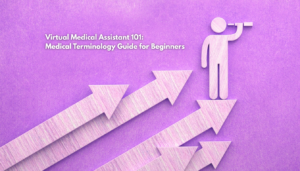Why Is AI Important in Healthcare: Transforming Patient Care and Efficiency
11 Jul 2025 By: Vlade Legaspi
Updated

AI is important in healthcare because it helps clinicians diagnose diseases earlier, choose better treatments, and deliver more personalized care using large amounts of medical data. It can speed up tasks like reading scans, spotting risks from lab results, and monitoring patients remotely. For example, AI tools can flag a possible lung nodule on an X-ray so a doctor can review it sooner and start treatment faster if needed.
The Role of AI in Diagnostics
Healthcare diagnostics receives significant impact from AI implementations. The current traditional diagnostic procedures take too much time while humans can make mistakes during these processes. AI technologies using machine learning algorithms have transformed medical diagnostics by delivering rapid precise diagnostic results.
Enhancing Accuracy and Speed
Artificial intelligence systems examine extensive medical data including imaging studies along with lab results and patient histories to detect patterns which human clinicians may miss at first glance. AI algorithms in radiology practice deliver exceptional precision when they detect anomalies within X-rays and MRIs. AI technology accelerates diagnosis and simultaneously decreases diagnostic errors.
The detection of diseases at their early stages becomes possible through AI which analyzes imaging data to find signs of developing medical conditions. The earlier treatment starts the better the patient’s outcomes become while the expenses for advanced disease care decrease. The growing confidence of healthcare professionals in machine-assisted diagnostics emerges from AI outperforming human radiologists in specific diagnostic tasks.
Personalized Medicine
AI technology creates new paths for personalized medicine through the delivery of customized medical treatments based on individual patient characteristics. AI systems that analyze genetic data together with clinical records help identify optimal treatments suitable for individual patient characteristics. Through this method treatment success increases while negative effects decrease which produces improved patient satisfaction.
AI integration with genomics enables a new understanding of diseases through molecular examination. The processing of extensive genomic sequencing data through AI enables the discovery of inherited disease tendencies that allow for early preventive strategies. Such a forward-thinking method will transform our healthcare system because it moves beyond treating illnesses to preventing them which benefits patients and decreases global healthcare system pressures.
Why Is AI Important in Healthcare: AI in Treatment Planning
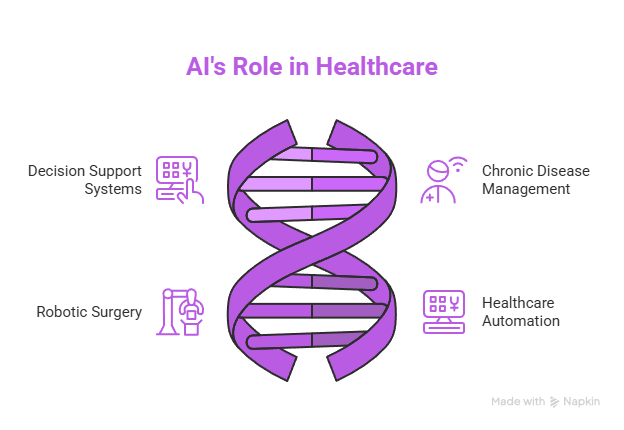
AI functions as an essential component for developing treatment plans after diagnostic procedures. The current complex nature of modern medicine which includes numerous treatment alternatives and guidelines becomes difficult for healthcare providers to handle. AI technology optimizes patient treatment selection through its ability to provide individualized care recommendations.
Decision Support Systems
AI-driven decision support systems give medical practitioners access to recommendations based on evidence for selecting appropriate treatments. The system draws information from case history databases and clinical guidelines and current research to generate the best treatment recommendations. Healthcare providers who utilize this technology achieve better patient outcomes through their enhanced decision-making abilities.
The management of chronic diseases benefits from AI technology through its capability to provide continuous patient monitoring and support services. AI algorithms examine data from wearable devices to monitor patient vital signs while notifying healthcare providers about any signs of potential issues. The proactive nature of this approach enables healthcare providers to provide timely medical interventions which minimizes complications.
Robotic Surgery and Automation
The field of robotic surgery experiences substantial advancement through AI technologies. Surgical robots which implement AI algorithms deliver complex operations with better accuracy than human surgeons. Patients experience decreased risks of complications together with shorter recovery periods when robotic surgery is used.
Healthcare automation reaches beyond surgical procedures. The combination of AI technology streamlines administrative work which enables medical staff to allocate more time toward caring for patients. Time and accuracy represent fundamental requirements in this field where efficiency plays a crucial role.
Improving Patient Engagement
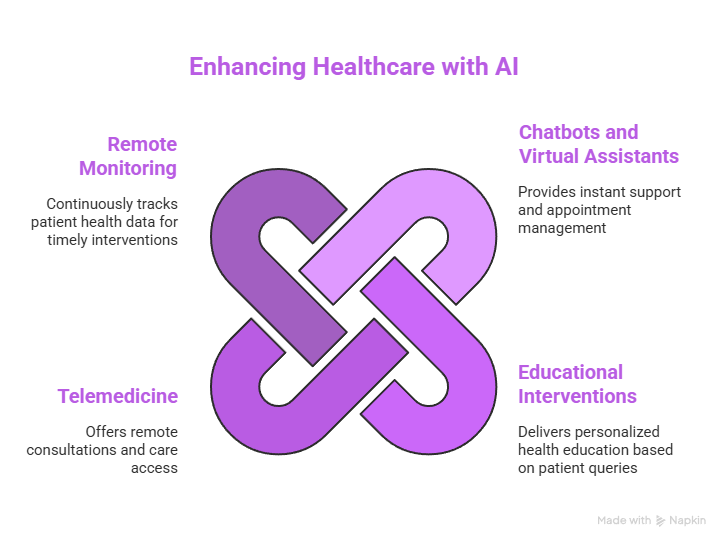
The healthcare system now engages patients differently because of AI advancements. When patients become more involved in their care it results in superior healthcare results and higher patient contentment. AI technologies help patients engage with healthcare services through various methods.
Chatbots and Virtual Health Assistants
Healthcare facilities are increasingly adopting AI-powered chatbots together with virtual health assistants. These tools let patients access instant replies to their inquiries and also assist with appointment bookings as well as medication reminder services. These technologies make healthcare more accessible which enables patients to take responsibility for their health management.
AI technology analyzes patient dialogue to determine where educational interventions should be applied. Healthcare providers can deliver specialized educational materials to patients based on their repeated queries about specific medical conditions which leads to improved patient experience.
Telemedicine and Remote Monitoring
Telemedicine gained more prominence through the COVID-19 pandemic as a result which revealed AI’s essential role in healthcare. Through AI algorithms healthcare providers can conduct remote consultations which deliver prompt care access to patients without requiring physical meetings. The remote healthcare approach benefits mainly patients who live in distant locations and people with limited mobility.
Through AI-enabled remote monitoring tools patients’ health data is continuously tracked which triggers healthcare provider notifications for major changes in their conditions. The ongoing monitoring system enables prompt interventions which leads to a better patient care approach.
Data Management and Security
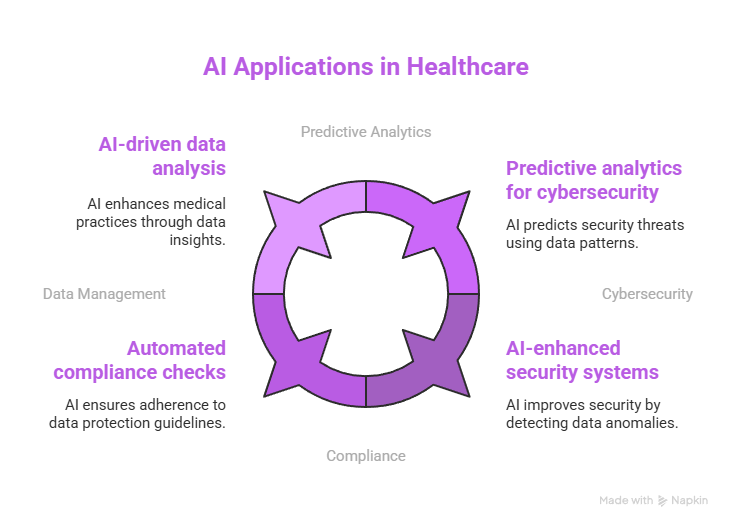
The growing volume of healthcare data requires improved methods for its management and protection. AI technologies actively support data management by securing and processing patient information effectively.
Data Analysis and Insights
AI technology processes extensive datasets to discover useful information which helps healthcare practitioners improve their medical practices. AI helps healthcare organizations enhance their services while improving outcomes by analyzing patient data patterns and correlations. Predictive analytics tools help hospitals predict patient admissions thus allowing better resource distribution.
AI technology helps identify potential health dangers in population groups which enables healthcare professionals to implement prevention measures for these risks. The data-driven strategy plays a crucial role in enhancing public health delivery while maximizing the efficiency of healthcare resource allocation.
Enhancing Cybersecurity
Digital health records have made cybersecurity a fundamental priority because of our growing dependency on these systems. Security systems become more effective when AI uses data pattern anomalies to detect potential breaches. Healthcare organizations can use machine learning algorithms to detect security threats before they occur thus protecting patient information.
The implementation of AI systems helps healthcare organizations maintain HIPAA compliance by following the strict guidelines for patient data protection. Tools like AI therapy notes HIPAA compliant solutions capture therapy sessions automatically and generate structured progress notes with end-to-end encryption, ensuring full regulatory compliance while cutting documentation time by 70%.The automation of compliance checks enables healthcare organizations to lower the cost of violations and strengthen their security position.
Challenges and Ethical Considerations
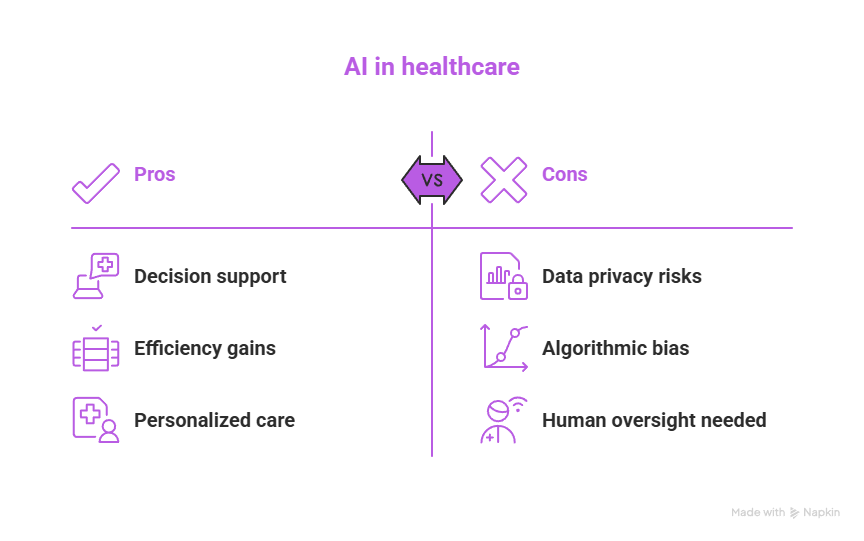
AI healthcare implementation brings various advantages yet healthcare organizations need to handle existing challenges and ethical matters. The use of AI technologies creates multiple issues regarding personal data protection along with systematic discrimination and the necessity for human intervention in medical choice-making.
Addressing Bias in AI Algorithms
The application of AI in healthcare faces a major issue because algorithms tend to display biased behavior. AI systems trained with patient data that lacks diversity may reproduce healthcare disparities found in the patient population. Marginalized groups might experience inferior treatment results because of this situation.
Healthcare organizations need to use diverse datasets when training their AI systems to minimize this problem. Continuous evaluation of AI performance in different demographic groups enables healthcare providers to identify biases and create fairer delivery systems.
The Importance of Human Oversight
AI systems, including whitelabel agentic AI deployments, serve as decision-making enhancers, yet healthcare professionals need to maintain their direct involvement in medical practice. Healthcare providers should consider AI tools as supportive instruments for their practice instead of attempting to use them as substitutes. Healthcare professionals need to maintain the final responsibility for patient care decisions because they understand individual cases better than AI systems do.
Patient care effectiveness improves when healthcare providers work together with AI technologies in a collaborative environment. Healthcare professionals need training to use AI systems effectively while preserving the essential human element that defines healthcare practice.
The Future of AI in Healthcare
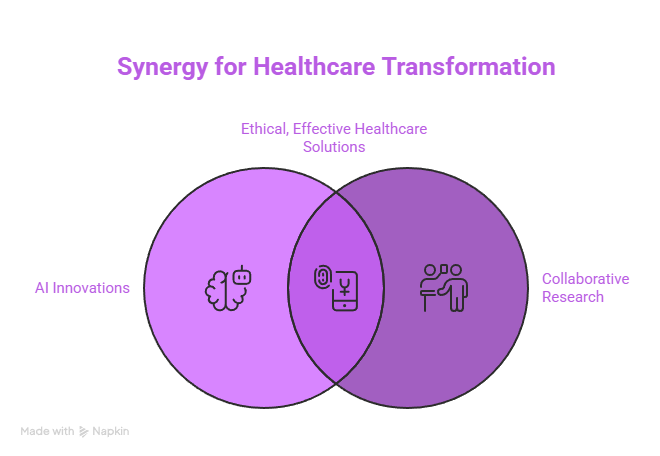
The healthcare industry will experience transformative changes through ongoing AI developments which will enhance its future potential. The progression of technology will expand the uses of AI which will result in better patient care outcomes and operational enhancements.
Innovations on the Horizon
Natural language processing (NLP) together with advanced robotics systems will emerge as fundamental technologies to transform the future of healthcare. NLP technology enables healthcare providers to improve their interactions with electronic health records which streamlines the process of retrieving necessary data and enhances documentation capabilities.
Robotic technology will advance to enable more advanced surgical methods and rehabilitative tools which will improve treatment results. The combination of AI systems with these emerging innovations should produce a better performing healthcare delivery system.
Collaborative Efforts and Research
Healthcare providers together with technology companies and researchers need to form strategic partnerships to advance AI applications in medical care. These stakeholders need to work together to spot problems and create new solutions that result in both ethical and effective AI technology implementation.
Research focused on AI’s lasting impacts on healthcare delivery and system performance will yield important information that will direct upcoming advancements. Patient outcomes need to stay the primary focus while ensuring equal healthcare access remains central as the industry develops.
TRENDING NOW!
Medical care provided by doctors undergoes transformation through the implementation of AI technology. The system enables doctors to detect health issues at an early stage while selecting optimal treatments and managing patient records more efficiently. Machine learning tools together with natural language processing enable medical professionals to analyze images and read patient notes while predicting potential health risks. The healthcare system becomes more individualized while reducing the pace of treatment. The implementation of AI technology allows medical staff to dedicate additional time to patient interactions. The development of healthcare technology continues through major companies Apple and Google who expand upon IBM’s Watson platform to create more personalized and patient-centered care.
Conclusion
The healthcare industry depends on AI because these technologies create substantial benefits that both improve patient health outcomes and optimize operational systems. AI technologies transform healthcare delivery by providing improved diagnostic capabilities and enabling personalized medical approaches. The industry must handle both technological and ethical barriers that come with AI adoption while it implements these innovations.
The healthcare sector can maximize AI benefits for patient care by building collaborations and achieving diverse data representation and maintaining human supervision. Healthcare stands on the threshold of major transformation through technological progress which places AI as its leading driving force.
HelpSquad health is ready to help. Our trained virtual assistants and 24/7 support team handle healthcare tasks with ease. With bilingual agents from $9/hr. you get expert help without high costs. Start your trial now and see the HelpSquad difference!
FAQ’s
What is the role of AI in healthcare today?
The article describes AI as an “additional medical assistance system” that supports clinicians by speeding up analysis, spotting patterns in data, and helping deliver more individualized care, while keeping humans responsible for final decisions.
What are examples of how AI is used in healthcare?
Examples in the post include AI-assisted medical imaging (e.g., flagging anomalies in X-rays/MRIs), decision support systems for treatment choices, robotic surgery and automation, chatbots/virtual health assistants, and telemedicine + remote monitoring (including wearables).
How can AI improve diagnostics and early detection?
It explains that machine learning can analyze imaging, labs, and patient histories to detect patterns clinicians may miss, helping reduce diagnostic errors and enabling earlier detection, often leading to better outcomes and lower costs for advanced-stage care.
How does AI support personalized medicine and treatment planning?
The article notes that AI can combine genetic data and clinical records to help identify treatments better suited to an individual, and it can recommend options using evidence, guidelines, case history databases, and research, supporting more tailored care plans.
What are the AI in healthcare benefits for patient engagement?
It highlights AI tools like chatbots and virtual assistants for instant answers, scheduling, and medication reminders, plus AI-enabled telemedicine and remote monitoring that can notify providers when a patient’s condition changes, helping patients stay more involved.
How does AI help with healthcare data management and cybersecurity?
The post says AI can process large datasets to generate insights (including predictive analytics like forecasting admissions for staffing/resources) and can detect unusual activity to help identify potential breaches; it also mentions supporting compliance workflows such as HIPAA-related checks.
What are the pros and cons of AI in healthcare (benefits and risks)?
Pros discussed include faster/more accurate diagnostics, better treatment planning, improved engagement, operational efficiency, and stronger security monitoring. Cons/risks include algorithmic bias from non-diverse training data, privacy/security concerns, and overreliance, so the article emphasizes ongoing evaluation and human oversight.
Where does HelpSquad get the information for this article, and why should readers trust it?
The article is written by Vlade Legaspi (credited with a background as an executive assistant and marketing team member) and is presented as a practical overview of healthcare AI topics. It references concepts like clinical guidelines, research, and HIPAA compliance, but it’s not framed as a medical study and doesn’t provide detailed citations for every claim, so it’s best used as a high-level explainer and starting point for deeper research.

